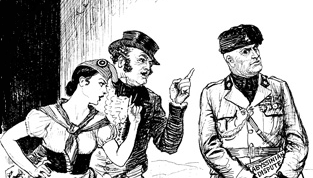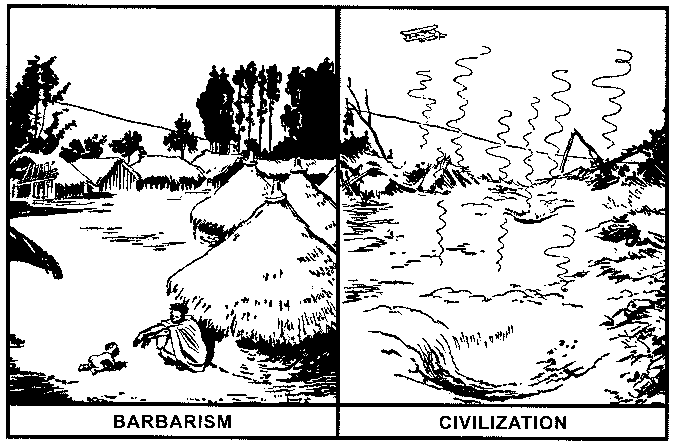The League in Abyssinia
|
In the 1930s,the League failed terribly. This page looks at its failure in Abyssinia.
By 1935, most countries did not think that the League could keep the peace. When Hitler began to break the Treaty of Versailles in the 1930s, the League was powerless to stop him. The League failed, and the only way to stop Hitler was a Second World War.
|
Going DeeperThe following links will help you widen your knowledge: The story of the Hoare-Laval Plan - very long and complicated, but it will help you understand the way British diplomats worked, and the difficulties they faced Different perspectives - Waugh v. Pearce.
Powerpoint: Abyssinia
|
Failure in Abyssinia, 1935The Dispute: Mussolini got ready to invade Abyssinia (Ethiopia). He wanted war and glory. Abyssinia asked the League to help.
What the League did: The League talked to Mussolini – but he used the time to send an army to Africa. The League suggested a plan to give part of Abyssinia to Italy.
The Outcome: Mussolini ignored the League, and invaded Abyssinia. The League banned weapons sales, and put sanctions on rubber and metal. The Abyssinian Emperor Haile Selassie went to the League to appeal for help, but it did nothing else – in fact Britain and France secretly agreed to give Abyssinia to Italy (the Hoare-Laval Pact). Italy conquered Abyssinia The League had failed.
Source AThis cartoon of 1935 in the British humorous/political magazine Punch shows international politics like a stage musical. ‘We don’t want you to fight, but by jingo if you do, We will probably issue a joint memorandum, Suggesting a mild disapproval of you.’ Click here for the interpretation
|
Consider:Why was the League of Nations unable to stop Italy taking over Abyssinia in the 1930s? The 'Why the League Failed' webpage suggests seven reasons why the League failed: 1. Weak powers 2. America was not a member 3. The League's structure/organisation was inefficient 4. World Depression made nations less cooperative 5. The more the League failed, the less authority it had 6. Its own members betrayed it and let it down 7. The League faced aggressive military fascist powers How many of these factors can you see at work in the League's failure in the Abyssinian crisis - where? Taking these ideas into account, WHY did the League fail in Abyssinia? |
Source B
Abyssinia: ResultsItaly left the League, Nov 1937, claiming that France and Britain were using the League as a 'screen' to work against Italy. Itay also left the 'Stresa Front' alliance (of France, Britain and Italy against Hitler), and allied instead with Germany (the 'Axis': 1 November 1936). |
|
Source CEveryone is talking now of the future of the League. Italy has won all along the line… So much for Collective Security and "moral forces" and all the rest of that stuff .. . It's no good thinking that Article 10 and Article 16 of the Covenant can remain. People who rely on them for safety will be let down as Abyssinia was let down. Thus the smaller nations are particularly alive to and are saying so vociferously in their press.... We now know pretty well where we stand, the Experiment has been made and failed. How lucky that it has been tried out in this minor test case, lucky for all except Abyssinia. Written by the historian AJP Taylor (1966)
Source DManchuria demonstrated that the League was toothless. However, the blow to the League was not a mortal one and the decisive test came two years later in the Abyssinian crisis... The Abyssinian crisis delivered a death blow to the League. It was already weakened by the departure of Japan in March 1933 and Germany in October. Italy left in 1937. While Britain and France were distracted, Hitler made his first major territorial move, sending a force of 22,000 men into the demilitarised Rhineland Written by the historian AP Adamthwaite (1977)
|
Source EThe crisis was fatal to the League. Nobody took it seriously again. They got ready for the Second World War. Written by the historian JR Western (1971)
Source FThe League died in 1935. One day it was a powerful body imposing sanctions, the next day it was a useless fraud, everybody running away from it as quickly as possible. Hitler watched. Written by the historian AJP Taylor (1966)
Consider:Using sources A-G, find and list all the results you can see of the League's failure in Abyssinia? |
Neville ChamberlainFinally, Source F is a VERY important statement, which you should try to read. In it, Neville Chamberlain, the British Prime Minister (reported in The Times newspaper) says what he thinks are the 'lessons-to-be-learned' from the Abyssinian Crisis. What he says, basically, is that it has proved that the League of Nations might have been able to sort out little problems, but that it clearly was unable to stop major crises – the nations would have to find another way to do that. In this document, THEREFORE, Chamberlain is publicly abandoning 'collective security' (and the League) as a way to maintain peace, and from this moment on he tried the different policy of 'appeasement'.
Source GI would like to make a few observations upon events of the last twelve months and their effect upon the League of Nations and the policy of collective security to which we have given so whole-hearted support with such disappointing results. The policy of collective security seemed to us, and I think it seemed to the people of the country as a whole, an attractive alternative to the old system of alliances and balance of power which nevertheless was unsuccessful in preventing the greatest war in history. The circumstances in which the dispute between Italy and Abyssinian began appeared to offer an opportunity for the exercise of that policy which could hardly be more favorable for its success. The aggression was patent and flagrant, and there was hardly any country to which it appeared that a policy of sanctions could be exercised with a greater chance of success than upon Italy. There is no use for us to shut our eyes to realities ... That policy has been tried out and it has failed to prevent war, failed to stop war, failed to save the victim of the aggression. I am not blaming anyone for the failure. I merely record it now because I think it is time that we reviewed the history of these events and sought to draw what lessons and conclusions we can from those events. There is no reason why, because the policy of collective security in the circumstances in which it was tried has failed, we should therefore abandon the idea of the League and give up the ideals for which the League stands. But if we have retained any vestige of common sense, surely we must admit that we have tried to impose upon the League a task which it was beyond its powers to fulfil. Surely it is time that the nations who compose the League should review the situation and if should decide so to limit the functions of the League in future that they may accord with its real powers. If that policy were to be pursued and were to be courageously carried out, I believe that it might go far to restore the prestige of the League and the moral influence which it ought to exert in the world. But if the League be, limited in that sort of way it must be admitted that it could no longer be relied upon by itself to secure the peace of the world. from a speech by British Prime Minister Neville Chamberlain to the 1900 Club (10 June 1936), reported in The Times (11 June 1936)
| |
|
| |


